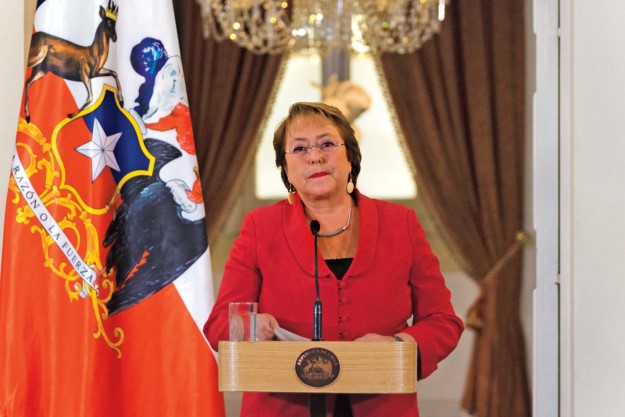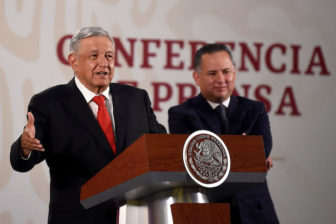This article is adapted from AQ’s latest issue on Latin America’s anti-corruption movement. | Leer en español
SANTIAGO – It was early April 2015 when, surrounded by journalists, Chile’s then-President Michelle Bachelet broke her silence. “I have not resigned, I am not thinking about resigning and I don’t even know how this would play out constitutionally,” she said. Bachelet had been avoiding the press for weeks, hoping in vain for the crisis engulfing her administration to cool down.
The scene was unimaginable only a few months before. Bachelet had been one of the most popular figures in Chile since the return of democracy. Elected for a second presidential term in late 2013 with 62% of the vote, she had already delivered a large portion of her ambitious campaign platform, including major education, tax and electoral reforms.
Then, her government was abruptly turned upside down.
In February 2015, a magazine broke a story telling how Bachelet’s oldest son, Sebastián Dávalos, and his wife, Natalia Compagnon, had allegedly engaged in insider trading and influence peddling in a multi-million-dollar real estate play. The media dubbed the scandal the “Caval Case” after Compagnon’s company, Sociedad Exportadora y de Gestión Caval. In the previous six months, two other major scandals involving multiple political parties had already rattled Chilean politics. Now for many Chileans, accusations involving Bachelet — seen as an austere and self-sacrificing leader, personifying Chile’s post-dictatorship reconciliation — were the final blow, “proving” that the whole political establishment was dominated by corruption
Chileans had always prided themselves on having a less corrupt political environment than their South American peers. From the mid-1990s to 2017, Chile usually scored among the top 10% in the World Bank’s global index for control of corruption, far ahead of its neighbors and even above the OECD average. Yet in just five months prior to April 2015, the share of the population considering corruption one of the top three problems of the country tripled from 9% to 28%, while support for Bachelet dropped by almost 10 percentage points.
But what happened next separated Bachelet from the average Latin American president fighting for survival after a devastating corruption scandal. The crisis was converted into a rare window of opportunity for reforming politics and “changing the rules of the game to make sure it never happens again,” according to economist Eduardo Engel, who would play a pivotal role in the process.
In the 18 months after Caval, Chile passed 12 major reforms in Congress — from campaign finance and parties’ reform to strengthening electoral courts and improving disclosure requirements for members of government — and dozens of administrative measures, in an unprecedented push towards greater transparency and better tools to fight corruption.
How did Chile do it? In short, through a mix of intense public pressure, a nonpartisan reform plan and clear-sighted presidential leadership.
After a period of uncertainty, Bachelet was persuaded by some advisors to face the crisis head-on, through a wide initiative on anti-corruption, transparency and integrity. The president reshuffled her cabinet, dismissing ministers tainted by scandals or who opposed the plan. The new upper echelon fully aligned with her new focus on anti-corruption.
Central to Bachelet’s strategy was the creation of the “Commission against Conflicts of Interest, Influence Peddling and Corruption,” an independent advisory body chaired by Engel. The government understood that any proposals coming directly from the La Moneda presidential palace would be received by the public with enormous skepticism — and that a more neutral agent would have to initiate the process. “We needed people with credibility beyond politics to propose a reform agenda that would not be partisan,” said Nicolás Eyzaguirre, who Bachelet transferred from the Education Ministry to the powerful General Secretariat of the Presidency to help lead the process.
The “Engel Commission,” as it became known, had 15 members, from a former central banker to a renowned social activist against child abuse. It was tasked with compiling recommendations “based on global best practices and listening to citizens, experts and international organizations through public hearings” — in 45 days. The final report had over 210 pages with 236 recommendations ranging from conflicts of interest regulation to campaign finance oversight. Based on the document, Bachelet unveiled a broad reform plan , the “Integrity and Transparency Agenda” (APT) , with 14 executive actions and 18 bills.
Congress was reluctant to embrace the APT, particularly senior lawmakers and party bosses fearful of stricter campaign finance and parties’ transparency norms. But the outrage created by the scandals, public support for Engel’s work and Bachelet’s leadership made opposing the APT politically suicidal for legislators. Once bills were put to a vote, deputies and senators felt an enormous pressure to vote in favor and not be perceived as undermining efforts to clean up the system.
When Bachelet left office in March 2018, Congress had already passed 12 major APT-related bills, while the executive branch had implemented several administrative changes. A 13th bill was approved in late 2018 under Bachelet’s successor, President Sebastián Piñera.
But did the reforms improve Chileans’ trust in their leaders? The answer is rather ambiguous, but it certainly did not make the political class fully regain the prestige it had enjoyed in the 1990s and 2000s. Smaller corruption cases continued to emerge, giving the impression that nothing had really changed. Also, changes were as deep as they were intangible: Chileans did not feel them in their daily lives.
“People wanted blood, not laws,” argued Bachelet’s finance minister, Rodrigo Valdés.
In any case, Engel’s original goal — to improve the “rules of the game” and significantly reduce the incentives and opportunities for corruption — was largely achieved. The two campaign finance scandals of 2015 and the Caval case seem significantly less likely to happen today.








